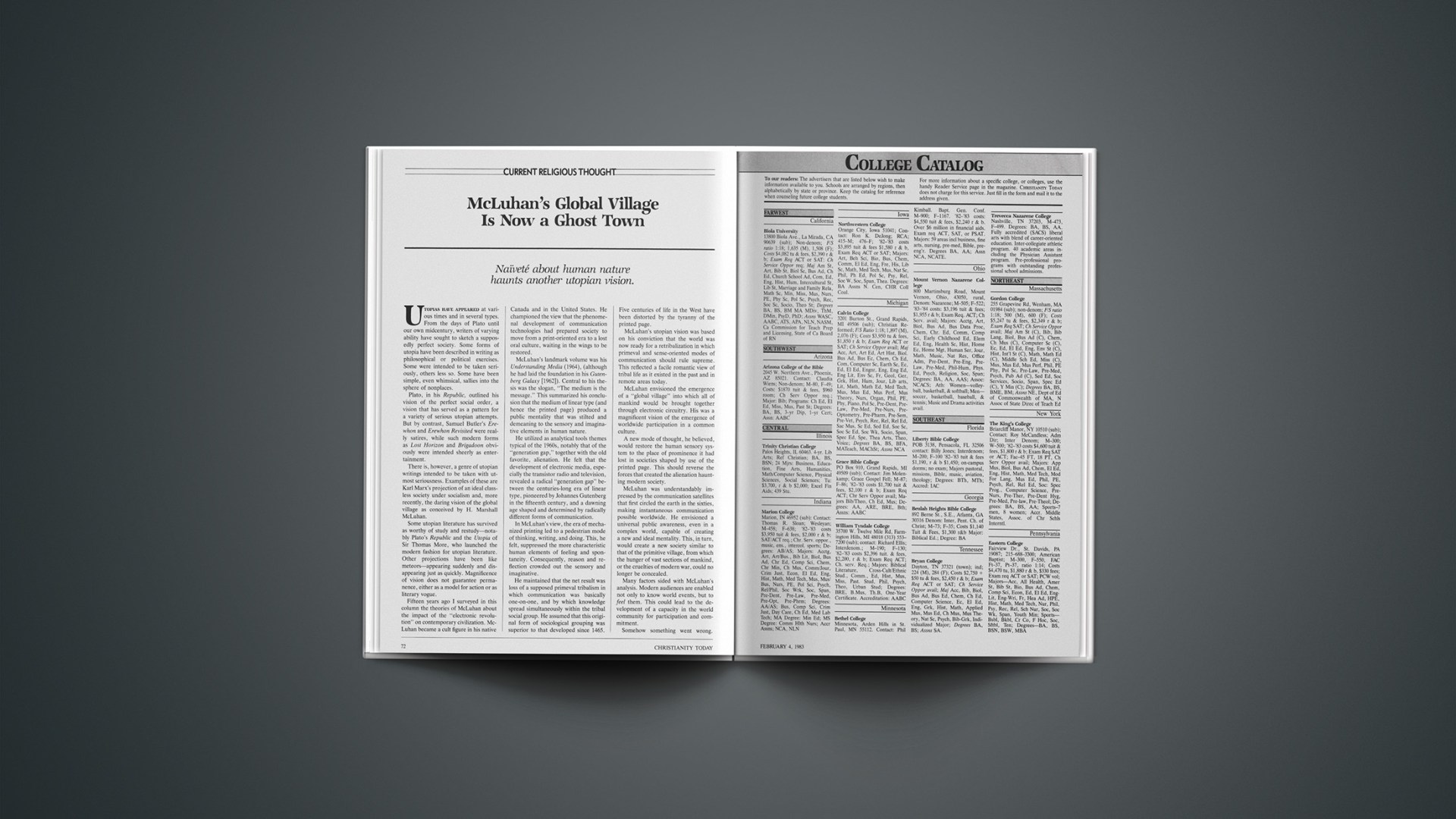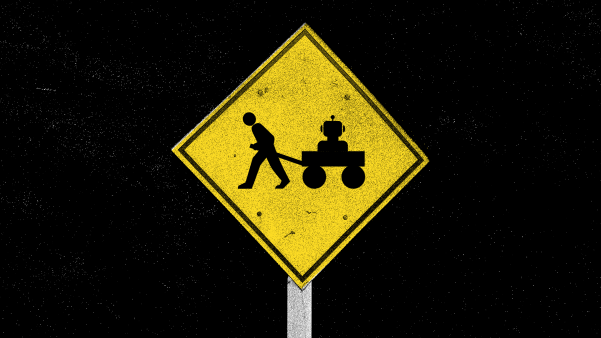Naïveté about human nature haunts another utopian vision.
Utopias have appeared at various times and in several types. From the days of Plato until our own midcentury, writers of varying ability have sought to sketch a supposedly perfect society. Some forms of utopia have been described in writing as philosophical or political exercises. Some were intended to be taken seriously, others less so. Some have been simple, even whimsical, sallies into the sphere of nonplaces.
Plato, in his Republic, outlined his vision of the perfect social order, a vision that has served as a pattern for a variety of serious utopian attempts. But by contrast, Samuel Butler’s Erewhon and Erewhon Revisited were really satires, while such modern forms as Lost Horizon and Brigadoon obviously were intended sheerly as entertainment.
There is, however, a genre of utopian writings intended to be taken with utmost seriousness. Examples of these are Karl Marx’s projection of an ideal classless society under socialism and, more recently, the daring vision of the global village as conceived by H. Marshall McLuhan.
Some utopian literature has survived as worthy of study and restudy—notably Plato’s Republic and the Utopia of Sir Thomas More, who launched the modern fashion for utopian literature. Other projections have been like meteors—appearing suddenly and disappearing just as quickly. Magnificence of vision does not guarantee permanence, either as a model for action or as literary vogue.
Fifteen years ago I surveyed in this column the theories of McLuhan about the impact of the “electronic revolution” on contemporary civilization. McLuhan became a cult figure in his native Canada and in the United States. He championed the view that the phenomenal development of communication technologies had prepared society to move from a print-oriented era to a lost oral culture, waiting in the wings to be restored.
McLuhan’s landmark volume was his Understanding Media (1964), (although he had laid the foundation in his Gutenberg Galaxy [1962]). Central to his thesis was the slogan, “The medium is the message.” This summarized his conclusion that the medium of linear type (and hence the printed page) produced a public mentality that was stilted and demeaning to the sensory and imaginative elements in human nature.
He utilized as analytical tools themes typical of the 1960s, notably that of the “generation gap,” together with the old favorite, alienation. He felt that the development of electronic media, especially the transistor radio and television, revealed a radical “generation gap” between the centuries-long era of linear type, pioneered by Johannes Gutenberg in the fifteenth century, and a dawning age shaped and determined by radically different forms of communication.
In McLuhan’s view, the era of mechanized printing led to a pedestrian mode of thinking, writing, and doing. This, he felt, suppressed the more characteristic human elements of feeling and spontaneity. Consequently, reason and reflection crowded out the sensory and imaginative.
He maintained that the net result was loss of a supposed primeval tribalism in which communication was basically one-on-one, and by which knowledge spread simultaneously within the tribal social group. He assumed that this original form of sociological grouping was superior to that developed since 1465. Five centuries of life in the West have been distorted by the tyranny of the printed page.
McLuhan’s utopian vision was based on his conviction that the world was now ready for a retribalization in which primeval and sense-oriented modes of communication should rule supreme. This reflected a facile romantic view of tribal life as it existed in the past and in remote areas today.
McLuhan envisioned the emergence of a “global village” into which all of mankind would be brought together through electronic circuitry. His was a magnificent vision of the emergence of worldwide participation in a common culture.
A new mode of thought, he believed, would restore the human sensory system to the place of prominence it had lost in societies shaped by use of the printed page. This should reverse the forces that created the alienation haunting modern society.
McLuhan was understandably impressed by the communication satellites that first circled the earth in the sixties, making instantaneous communication possible worldwide. He envisioned a universal public awareness, even in a complex world, capable of creating a new and ideal mentality. This, in turn, would create a new society similar to that of the primitive village, from which the hunger of vast sections of mankind, or the cruelties of modern war, could no longer be concealed.
Many factors sided with McLuhan’s analysis. Modern audiences are enabled not only to know world events, but to feel them. This could lead to the development of a capacity in the world community for participation and commitment.
Somehow something went wrong. The vision faded, and, in place of a global village, there has emerged a world that resembles the medieval manor, with the hereditary castle towering above a tragic, nondescript collage of hovels. To put it in modern idiom, in the world of today, towering skyscrapers and impressive condominiums are surrounded by all sorts of ugly, squalid structures.
In place of a universal group viewing of world events, with a global sharing of compassion and concern, we see television viewing, for example, to be less and less a whole-family affair. Joggers perform their daily ritual, frequently as lone individuals, with ear-plugs of transistors brightening up their paces. Youths gather around electronic games, not in groups participating in worthwhile sharing of human concerns, but as individuals hunching over the consoles, with tense faces, pushing buttons or shifting levers.
It is ironic that newer technologies have made listening and seeing increasingly insulated and privatized. The vision of new commitments to world justice and to concerted action to alleviate world inequities has faded. The ideal of a village of world proportions moving toward harmony among persons, groups, and nations has been lost along the way.
What vital elements did Marshall McLuhan fail to incorporate into his vision? Here are some suggestions: First, his advocacy of the village as an ideal model for human society was romantic and wholly inadequate. His insistence that society should be basically nonreflective and nonrational failed to take into account deeper elements of human existence, such as the life of the mind, and, deeper still, mankind’s profound moral sense.
McLuhan’s system failed to reckon with the deeper understanding of mankind as bent and twisted and, equally important, the conception of what men and women can become by God’s grace. These last are indispensable to any viable vision of an ideal society. To some this may seem “old hat,” but conceivably it yet may fit modern heads.
HAROLD B. KUHN1Dr. Kuhn is professor of philosophy of religion at Asbury Theological Semianry, Willmore, Kentucky.










